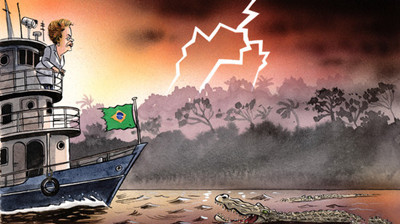巴西经济
Rough weather ahead
极端天气在前
The mistakes Dilma Rousseff made during her first presidential term mean her second will be stormy
迪尔玛·罗塞夫在她第一个任期内所犯的错误将使她的第二个任期风雨交加
WHILE Dilma Rousseff prepared to be sworn in for a second term as Brazil's president on January 1st, the skies over the capital, Brasília, were forecast to be clear. But the outlook for the next four years is gloomy. Her daunting to-do list includes repairing ties with America, damaged by the revelation in 2013 that its spies had tapped her phone calls. Deforestation in the Amazon region is rising after a decade of decline, and the worst drought on record threatens to bring energy and water rationing to the industrial south-east. Preparations for the 2016 Olympics in Rio de Janeirorisk a reprise of the deadline- and budget-busting run-up to the 2014 football World Cup, which Brazilalso hosted. Ms Rousseff's left-wing Workers' Party (PT) and its allies are embroiled in a corruption scandal involving Petrobras, the state-controlled oil giant, though so far she is personally untainted.
当迪尔玛·罗塞夫准备一月一日的巴西总统连任宣誓时,天气预报显示首都巴西利亚是晴天。但是对于未来四年前景的展望却不容乐观。她艰巨的工作任务清单中包括修复与美国因2013年窃听丑闻而破碎的外交关系。亚马逊地区的森林破坏速度在经历十年的连续下降后重新上升,有史以来最为严重的干旱对东南地区的能源与水资源配给带来了严峻考验。2016年巴西里约热内卢奥运会的筹备工作再一次面临着预算无法按期筹集的危险,而这一风险在2014年巴西举办足球世界杯时就已经开始积累了。尽管罗塞夫本人没有任何污点,但她的左翼工党势力与其盟友却卷入国有石油巨头巴西石油公司的腐败丑闻中。

But it is the economy where the storm-clouds are stacked highest. The end of the commodity supercycle means falling prices for Brazilian exports of soyabeans, iron ore and, most recently, oil. And the policies Ms Rousseff pursued during her first term have proved disastrous. A combination of macroeconomic laxity and microeconomic meddling, intended to boost growth, merely undermined public finances and her credibility. GDP rose by just 6.7% during her first four years. Her biddable Central Bank governor, Alexandre Tombini, and finance minister, Guido Mantega, cut interest rates and let rip on public spending even as inflation rose and tax receipts slowed. If her second term is to be any better, she will need to undo much of what she did in the first.。
但是现在经济风暴正猛。大宗货物超级周期的结束意味着巴西出口的大豆、铁矿和石油的价格跌落。这已经证明了罗塞夫在其第一个任期内所推行的政策是灾难性的。宽松的宏观经济政策与干预性的微观经济政策相结合,旨在促进经济增长,但仅仅只是逐步削弱了公共财政体系和她的个人声誉。在她的四年任期内,国内生产总值仅仅增加了6.7%。即使在通货膨胀上升、税收收入下降的情况下,听命于她的中央银行行长亚历山大·托比尼和财政部部长吉多?曼特加依然降低利率与削减公共开支。如果她想在第二个任期内能做得更好,那么她需要停止许多她在上个任期中所做的事。
Ms Rousseff has made a start by recruiting Joaquim Levy, a hawkish banker, to replace Mr Mantega, and Nelson Barbosa, a respected economist, to the planning ministry, where he will oversee public investment. Mr Tombini will remain at the Central Bank, but has clearly been told to take the inflation target of 4.5% seriously; since Ms Rousseff's victory in October, the benchmark interest rate has been raised from 11% to 11.75%. New agriculture and trade ministers with ties to farmers and industry signal a truce with the maligned private sector. The foreign ministry, too, is expected to get a more trade-friendly boss.
罗塞夫已经做出了改变,她任命强硬派银行家若阿金·莱维取代吉多?曼特加曼成为新任财务部部长,受人尊敬的经济学家尼尔森·巴博萨任计划部部长,在那里他将监督公共投资。托比尼继续留任中央银行行长,但是已经被明确告知确立4.5%的通胀目标的严重性;自罗塞夫在十月的大选胜出后,银行基准利率已经从11%提高到11.75%。与农民和工业具有紧密联系的新农业贸易部部长与私营贸易部门达成了和解。外交部部长也希望获得更多能进行友好贸易往来的老板。
Mr Levy, in particular, has his work cut out. He has promised a primary budget surplus (before interest payments) of 1.2% of GDP in 2015 and 2% in2016 inorder to avoidBrazillosing its investment-grade credit rating. But under Mr Mantega opaque and inefficient subsidies to energy, transport and credit ballooned. And half of all primary public spending (including on pensions) moves in step with the minimum wage, which is to rise by around 2.5% in real terms in 2015 under a multi-year formula that links it to past GDP growth. This means that Mr Levy must find savings of 2.1% of GDP elsewhere. A surplus of 0.7-0.8% is more plausible, thinks Mansueto Almeida, a public-finance expert.
特别是莱维先生,他需要削减自己的工作。为了避免巴西失去其投资级别信用评级,他已经承诺的基本预算盈余(支付利息之前)将占2015年国内生产总值的1.2%。但是在曼特加针对能源不透明与低效补贴的情况下下,运输和信用问题不断膨胀。根据过去国内生产总值的相关公式计算,约一半初级公共支出(包括养老金)与最低工资均稳步提高,增长将约2.5%。这意味着莱维必须从其他地方找到占国内生产总值的2.1%的盈余。公共财政专家艾梅达认为0.7%-0.8%的盈余才更为合理。
Even hitting that lower target will mean cutting public investment and raising taxes—thereby making a return to growth even harder to achieve in the short term.Brazil's tax burden, already at 36% of GDP, is far higher than that of other middle-income countries. And its big construction firms, which are alleged to have bribed Petrobras for contracts, are likely to get caught up in legal proceedings and thus barred from public work. That puts at risk planned infrastructure projects budgeted at 870 billion reais ($325 billion), including some needed for the Olympics. After a 7.2% drop in investment in 2014, Itaú, a bank, expects investment to be flat in 2015. Analysts have duly slashed growth forecasts for 2015 from 2.5% a year ago to 0.8% or less. Some predict an outright recession.
即使要达到较低的目标也将意味着公共投资的削减和税收的提高,以此来恢复增长,这甚至难以在短期内达到。巴西的税收负担,已经达到了GDP的36%,远远高于其他中等收入国家。其最大的建筑企业,被指控向巴西石油公司进行贿赂而获取合约是指贿赂,有可能因为陷入法律诉讼而被禁止进行公共工作。这增加了预算为8700亿雷亚尔(3250亿美元)的基建项目的计划风险,其中包括一些奥运所需要的设施。当2014年的投资总额下降7.2%以后,巴西伊塔乌投资银行银行,预计2015的投资总额将与其持平。分析师们已经将2015年经济增长预期从一年前的2.5%下调到到0.8%甚至更少。有人预测经济将出现衰退。
Mr Levy's task should become slightly easier in 2016, when, thanks to stalled GDP growth, spending linked to the minimum wage should merely keep pace with inflation. Ms Rousseff's, by contrast, is likely to become harder, thinks Jo?o Castro Neves of Eurasia Group, a consultancy. The PT's left-wingers and their sympathisers in trade unions and social movements despise Mr Levy, whom they call “Scissorhands”. The party's allies in government are in a mutinous mood: in December 35 of 71 congressmen from its biggest coalition partner refused to vote with the government to revise this year's unattainable primary-surplus target of 1.9% (though the measure passed anyway). The Petrobras affair, which the opposition is exploiting with gusto, will further deplete the president's already diminished political capital.
莱维先生在2016年的的任务将变得容易些,由于停滞的GDP增长,与最低工资相关的支出应跟上通货膨胀的速度。相反的,罗塞夫的任务可能会变得更加困难,美国智库欧亚集团的分析师若奥·卡斯特罗·内维斯认为。工党的左翼分子和他们的工会运动、社会运动支持者并不待见莱维先生,并称他为“剪刀手”。该党在政府中的盟友存在反叛的情绪:在12月,71名国会议员中的35人拒绝投票赞成政府修订今年无法实现的1.9%的初级盈余目标(尽管最后法案获得了通过)。反对党对巴西石油公司事件的深度挖掘与利用,将进一步消耗总统日益减少的政治资本。
Austerity will also hit her popularity in the country at large. Petrol prices have already gone up; electricity and public transport are next. The most recent plan to raise bus fares in big cities, in June 2013, sparked the biggest protests in a generation, and was quickly dropped. Any fiscal and monetary adjustment big enough to restore public finances is sure to push up the jobless rate, which is now close to a record low of around 5%.
紧缩政策也会降低她在国内的支持率。汽油的价格已经上涨了;电力和公共交通则是下一个。最新的计划是在大城市提高巴士票价,在2013年六月,这引起了一个群体的强烈反对于是很快就被废弃了。任何足以恢复公共财政的财务和货币调整都肯定会推高失业率,现在的失业率维持在5%左右,接近历史最低值。
Ideally, Ms Rousseff will let Mr Levy snip away, and use the Petrobras scandal to revitalise the ailing oil and construction industries by opening them up to foreign competition and dropping onerous (and graft-inducing) local-content rules. But having promised Brazilians that belt-tightening would be painless, she may unbuckle at the first twinges of discomfort. Even if she does not, her new-found appetite for reforms will not be matched by her capacity to accomplish them.
理想的情况是,罗塞夫将让利维自行去处理,并且利用巴西石油公司的丑闻去振兴境况不佳的石油,通过引入国外竞争力、减少当地法规限制去发展建筑产业。但是罗塞夫已经向国民许诺紧缩政策将不会为他们生活带来痛苦,她也许解除第一次阵痛带来的不适。即使她没有诺,她目前的能力将无法帮助他去实现新的改革愿望。译者 王巍













